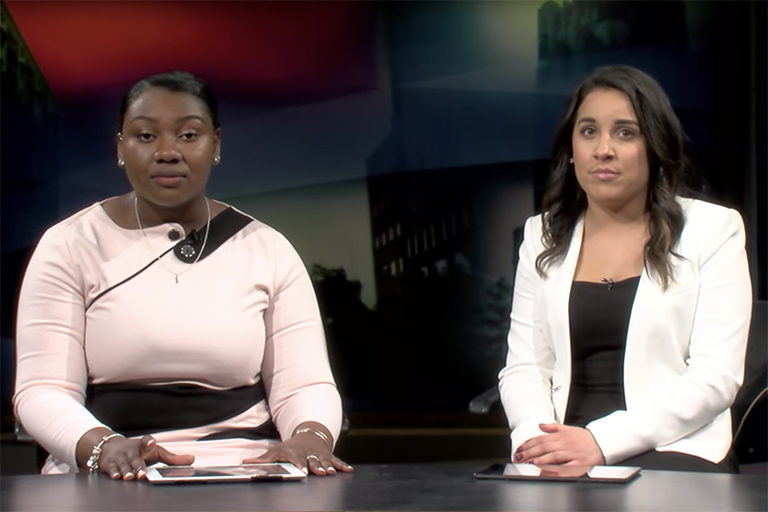Michigan State memorabilia covers every inch of Bob Gould’s office. The broadcast journalist in residence has been a Spartan since starting his undergraduate career here in ’86 and now heads his own classrooms. Earlier this semester, he was just introducing his JRN 406 Focal Point class to the world of broadcast journalism when news detailing the extent of Larry Nassar’s abuse became the forefront of national media.
Gould and students alike had to put aside their university loyalty to objectively cover the largest and most horrific story that the Spartan community has ever — and hopefully will ever — see.
“Everybody just said, ‘Yeah, let’s do this,’” said Gould. “So we were quickly trying to mobilize crews to different aspects of things and [figure out] how were we going to cover it and what the different angles would be. It was quite an ordeal.”
A Quick Turnaround
No one was surprised when Gould proposed dedicating a 30-minute special to this story. Griffin Stroin, a Journalism sophomore and one of the show’s senior producers, said that he had a gut feeling they would be covering Nassar before Gould even mentioned it.
“With the biggest story in the country in our backyard, it would have been disgraceful if we didn’t do it,” said Stroin.
Though the beginning of the semester brought new students into the mix, the entire team rallied together to cover the story from every possible angle — in a week and a half. Unsurprisingly, the production process was hectic. But students knew they had to do it right and do it well, that it was important to give attention to all perspectives of the conflict.
“It’s the story of the survivors, the campus, but more largely, of a climate,” said Chloe Kiple, a Journalism senior and reporter. “We needed to be all over this, and we [were].”
Overcoming Professional Challenges
MSU had the attention of the entire nation as the sentencing played out and more and more survivors came forward. While being students of the university gave the reporters exclusive access, separating themselves was difficult.
“We are affected by everything that is happening,” said Kiple. “We have to live with the fallout. But as a journalist, it’s your job to be impartial. This was a great test of our professionalism.”
Media all over the country covered the story 24/7, and it was no different for the Focal Point team. Juggling such a large project with all other student responsibilities was quite the balancing act.
“You never know when more of the story is going to break, so you have to keep on your toes,” said Journalism senior and reporter Ryan Cole. “But the reward is that I know I’m getting the best real-world experience of any journalism student in the country, and that I’m learning life lessons that no one else can match.”
Taking a Toll
Of course, covering the Nassar case was also demanding emotionally. Cole admitted that it was difficult to keep his emotions in check while remaining impartial in his reporting.
“I find impartiality to be the most important part for a journalist to master,” said Cole. “However, when your own university — a place I grew up loving and dreaming of attending — becomes the centerpiece of a national scandal, it’s naive to say it didn’t affect me internally.”
Gould wasn’t impervious to the stresses of this story either, but he used the experience as a learning opportunity. He wrote two separate articles for the Center for Journalism Ethics at the University of Wisconsin-Madison: one on the personal experience of covering the story and another on teaching students how to cover stories that hit close to home.
“I talked to students in the State News and in the classroom,” said Gould. “How do you handle this? How do you deal with the emotions of a case when you’re hearing victim testimony over and over and over again?”
Focal Point Pride
According to Stroin, producing this special was unlike any show they’d broadcast before.
“I’d love to say it was like any other show, but in reality, it was so different,” said Stroin. “We had a lot more moving parts in this show with more reporters fronting their packages, but mainly the energy was different. We understood the importance of telling all these stories, and we all put 110 percent into this show.”
Now that the special has gone live and gotten over 1,300 views on YouTube, the team is looking back on their work with pride.
“Personally, I am just so proud of what we were able to accomplish,” said Stroin. “The hard work and sacrifice we put into this show is something that I will remember forever. And at the end of the day, I think we put out a great show that helped people share their stories.”
Gould was especially impressed with the way his students were able to bring all of the pieces together to produce the special in such a short amount of time.
“This is one of the best shows, I think, in 11 years that we’ve done here, if not the best one I’ve seen — and we’ve done a lot of shows,” said Gould. “I couldn’t have asked for anything more in how they pulled it together.”
The Focal Point team is hoping that their storytelling is contributing to the movement for awareness and change at Michigan State.
“These girls were let down by a system that failed to protect them and their lives will never be the same,” said Kiple. “Now, I want to see change at an administrative level so that this never happens again. The national news trucks are gone, but we will not stop covering this story. What has happened is absolutely heartbreaking, but I am hopeful moving forward because I know there’s feisty journalists out there who will continue to hold authorities accountable.”
By Kaitlin Dudlets
